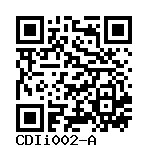01434
CDIi002-A
General
Cell Line |
|
| hPSCreg name | CDIi002-A |
| Cite as: | CDIi002-A (RRID:CVCL_VC63) |
| Alternative name(s) |
01434
|
| Cell line type | Human induced pluripotent stem cell (hiPSC) |
| Similar lines | No similar lines found. |
| Last update | 17th April 2024 |
| User feedback | |
Provider |
|
| Generator | FUJIFILM Cellular Dynamics, Inc. (CDI) |
| Owner | FUJIFILM Cellular Dynamics, Inc. (CDI) |
| Derivation country | United States |
External Databases |
|
| BioSamples | SAMEA104012990 |
| Cellosaurus | CVCL_VC63 |
| Wikidata | Q54809072 |
General Information |
|
| Projects | |
| * Is the cell line readily obtainable for third parties? |
No |
Donor Information
General Donor Information |
|
| Sex | female |
| Ethnicity | Caucasian |
Phenotype and Disease related information (Donor) |
|
| Diseases | No disease was diagnosed.
|
| Disease associated phenotypes | no phenotypes |
Karyotyping (Donor) |
|
| Has the donor karyotype been analysed? |
Yes
Normal
Karyotyping method:
G-Banding
|
Other Genotyping (Donor) |
|
| Is there genome-wide genotyping or functional data available? |
No
|
External Databases (Donor) |
|
| BioSamples | SAMEA104012970 |
Ethics
| Has informed consent been obtained from the donor of the embryo/tissue from which the pluripotent stem cells have been derived? | Yes |
| Was the consent voluntarily given? | Yes |
| Has the donor been informed that participation will not directly influence their personal treatment? | No |
| Can you provide us with a copy of the Donor Information Sheet provided to the donor? | No |
| Do you (Depositor/Provider) hold the original Donor Consent Form? | No |
| If you do not hold the Donor Consent Form, do you know who does? | No |
| Please indicate whether the data associated with the donated material has been pseudonymised or anonymised. | anonymised |
| Does consent explicitly allow the derivation of pluripotent stem cells? | No |
| * Does consent expressly prevent the derivation of pluripotent stem cells? | No |
| Does consent prevent CELLS DERIVED FROM THE DONATED BIOSAMPLE from being made available to researchers anywhere in the world? | No |
| How may genetic information associated with the cell line be accessed? | No information |
| Will the donor expect to receive financial benefit, beyond reasonable expenses, in return for donating the biosample? | No |
| Has a favourable opinion been obtained from a research ethics committee, or other ethics review panel, in relation to the Research Protocol including the consent provisions? | Yes |
| Name of accrediting authority involved? | NICHD-NIH |
| Approval number | N01-HD-4-2865 |
| Has a favourable opinion been obtained from a research ethics committee, or other ethics review panel, in relation to the PROPOSED PROJECT, involving use of donated embryo/tissue or derived cells? | No |
| For generation of the cell line, who was the supplier of any recombined DNA vectors or commercial kits used? |
hIPSC Derivation
General |
|
| Source cell type | |
Reprogramming method |
|
| Vector type | Integrating |
| Vector | Virus (Retrovirus) |
| Genes | |
| Is the used vector excisable? |
No |
| Absence of reprogramming vector(s)? |
No |
| Reprogramming vectors silenced? |
Yes |
| Methods used |
PCR
|
Vector free reprogramming |
|
Other |
|
| Selection criteria for clones | Clones were selected using a proprietary assay that determined pluripotency. |
| Derived under xeno-free conditions |
No |
| Derived under GMP? |
No |
| Available as clinical grade? |
No |
Culture Conditions
| Feeder cells |
No |
| Medium |
mTeSR™ 2
|
Characterisation
Analysis of Undifferentiated Cells
| Marker | Expressed | Immunostaining | RT-PCR | Flow Cytometry | Enzymatic Assay | Expression Profiles |
| POU5F1 (OCT-4) |
Yes |
|
||||
| NANOG |
Yes |
|
||||
| LIN28 |
Yes |
|
Pluripotency of established iPSC cultures were tested by qPCR on bulk samples using 48 genes including standard pluripotency genes. Samples were assigned a passing score after analysis with a non-supervised classifier based on am appropriate sample set.
Differentiation Potency
Microbiology / Virus Screening |
|
| HIV 1 | Negative |
| HIV 2 | Negative |
| Hepatitis B | Negative |
| Hepatitis C | Negative |
| Mycoplasma | Negative |
Genotyping
Karyotyping (Cell Line) |
|
| Has the cell line karyotype been analysed? |
Yes
Normal
Karyotyping method:
G-Banding
|
Other Genotyping (Cell Line) |
|


Login to share your feedback, experiences or results with the research community.